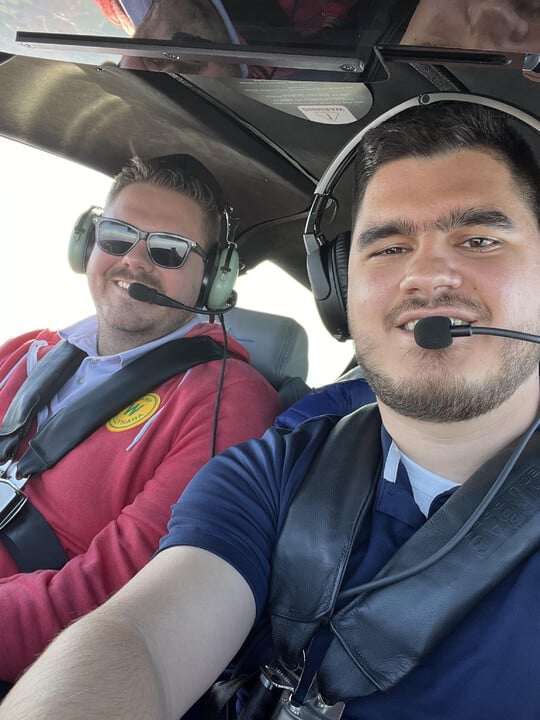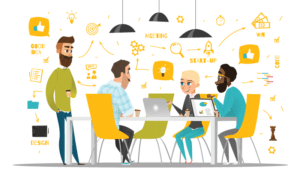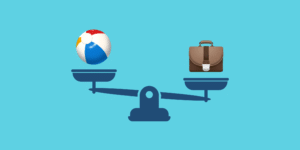My Journey in the Restoration Industry
Last updated: June 22nd, 2023

Contents
It’s been over a month since I inked my offer letter from Albiware. On that day, if you told me that I’d be writing a LinkedIn article from the Pilots Lounge in Indianapolis after a multi-stop trip in a single-engine plane, I’d say that you needed to get your head checked. On my first day, Alex Duta XCT (CEO of Albiware/podcaster/restorer extraordinaire) did mention to me that he was a pilot and that he would “Take me on a flight sometime” – I remember responding something along the lines of “Uhh probably not, that sounds terrifying.”
What a difference a month makes! I should mention this isn’t Alex’s plane. He’s not some bond villain who can afford million-dollar planes. It turns out, it’s quite economical to rent an aircraft vs flying commercial once you have the licensing and hours required to fly the plane. It’s a huge time saver when traveling regionally and making multi-stop trips.
Is Culture Really a Lame Corporate Buzzword?
I always thought so – primarily because most jobs claim their culture is fantastic in the beginning, only to find out it’s downright toxic. When it comes to Albi, I would describe the environment as electric. The office is always buzzing. With product updates, ideas, and excitement over new restorers coming aboard with us, energy is palpable in the air. The teams are collaborative and supportive, helping each other in any way possible.

Leadership is always accessible and ready to listen to new ideas. As we grow, processes change or need to be created, and they’re very good at learning from mistakes. They were even remarkably accessible while onboarding over 200 Cowan Restoration employees in Australia with a 16-hour time difference!
During my interview process, I made sure to find out if Albi was some get-rich-quick scheme or if they were in this for the long haul and truly cared about restorers’ needs. Obviously, I confirmed the latter, and it shows. Everything we do is designed to make restorers’ lives easier whether it’s helpful content such as Albi After Hours Podcast or our actual software.
Albi has a strong culture of learning and self-improvement. In two months, I have digested two sales books that have shaken my idea of sales. Coming from the world of storm restoration, D2D sales got me very attuned to the notion that most or all prospects should be self-generated and closed.
Flying cars? Not yet, but a new wave of sales methods is making the old seem a bit barbaric.
The revolution of Inbound Marketing and Sales was something I was completely naïve to until I started at Albi. My direct manager, Zachary M. Martin, told me he was a complete marketing nerd and asked if I shared the same passion as him. I told him that I thought marketing was boring and didn’t have much interest in it. He told me that I would come around and what then seemed a novel idea – marketing and sales are the same things.

Credit to Zak; he asked me if I liked reading and learning before I started. Of course, I said yes, and I had been sorely missing the bandwidth to absorb as much information as I’d like. In my first week, he had me reading Inbound Selling: How to Change the Way You Sell to Match How People Buy by Brian Signorelli. I’m pretty sure this was some master plan he had to get me into marketing and creating content. I started pumping out content about storm restoration just about right away. Keep an eye out for those releases from the company page.
Due to this methodology, my new role has me meeting with candidates who have already expressed an interest, agreed to block out time on their busy schedule to talk to me (shoutout to our awesome team of SDRs), and usually absorbed some of our content or researched our product. This is a night-and-day difference! I feel like my years of door-to-door were spent doing the most brutish form of sales (and some would say most difficult), and my new setup is more advanced and intelligent.
I’ve had to get used to a longer sales process, as signing a contract with a homeowner for their insurance claim is much different from the B2B software game. Additionally, I don’t want to put Albi in the hands of a restorer who won’t get value out of it. This qualification process is on me to ensure we’re not doing anyone a disservice by setting them up with robust software that does way more than they need.
Disrupting the market sounds so negative. Can we just call it… dramatically improving the relationship between restorers and technology?
Comparing the brutish nature of my old sales process to my new intelligent and thoughtful one draws many parallels to our product and what I have learned since I started. I knew from my background that most restoration software was antiquated and not intuitive; comparably, ours was newer and easier to use.
However, it wasn’t until I did a few demos and showed some of our features that I saw the reaction of managers/owners and field people’s responses to understand how much we were challenging the status quo. Most restoration software is clunky, outdated, and requires a ton of manual intervention by personnel to make sure things go smoothly.
“Wow, that’s really cool”
“One thing I hate about (job management software) is…”
“I don’t want to use 7 apps to do one job”
These are phrases I hear every day, multiple times a day. It happens on every one of the product demos I run. The only thing more common than that phrase is “We want to scale our business” whenever I ask what their 12-month goals are. I would say just about every restorer/roofer wants to scale. Most have no idea where to go with that thought, other than hiring more people and getting more jobs. It’d be great if it were that simple. The answers I get on how folks plan on scaling range as far as you can imagine.
I love having these discussions on how to attain their goals (with or without Albi) and any information I can share with them to help. I also enjoy workshopping process improvements on my calls with them and seeing the excitement when they realize they’re not as far away from the mark as they initially thought.
The Work-Life Balance I Desperately Needed

I talked about this in a previous article, but one of the main reasons I decided to make the jump to Albi was the fact that I was working on the road 5 days a week for about 9 months out of the year. This was hard on both me and my wife, and since I’ve started at Albi we spend every night sitting at the dinner table, phones screen face down, enjoying the time that used to be so hard to come by.
Full disclosure, I am the type of person that typically works outside of normal work hours as a choice. The keywords there is a choice. In my old role, I couldn’t escape the wail and vibration of my phone going off – I felt like I had to answer 24/7. Clients, my direct reports, and owners alike all needed unfettered access to me.
To give you an idea of how many people that is, I signed up 100-175 new clients every year and I had between 12-15 sales reps I managed. Some days, I’d spend well over 8 hours on the phone. When my wife wanted to talk, I barely had the energy to do so. It wasn’t fair to me, and it definitely wasn’t to her. I can’t remember a time in my life when I felt this much “fit” at a workplace. The people, the culture, and the product all align perfectly with what I am about and what I strive to be. Here’s to going to the moon with Albi!
What you should do now
- Get a Free Demo and see how Albiware can help solve your restoration software challenges.
- Read more articles in our blog.
- If you know someone who’d enjoy this article, share it with them via Facebook, Twitter, LinkedIn, or email.